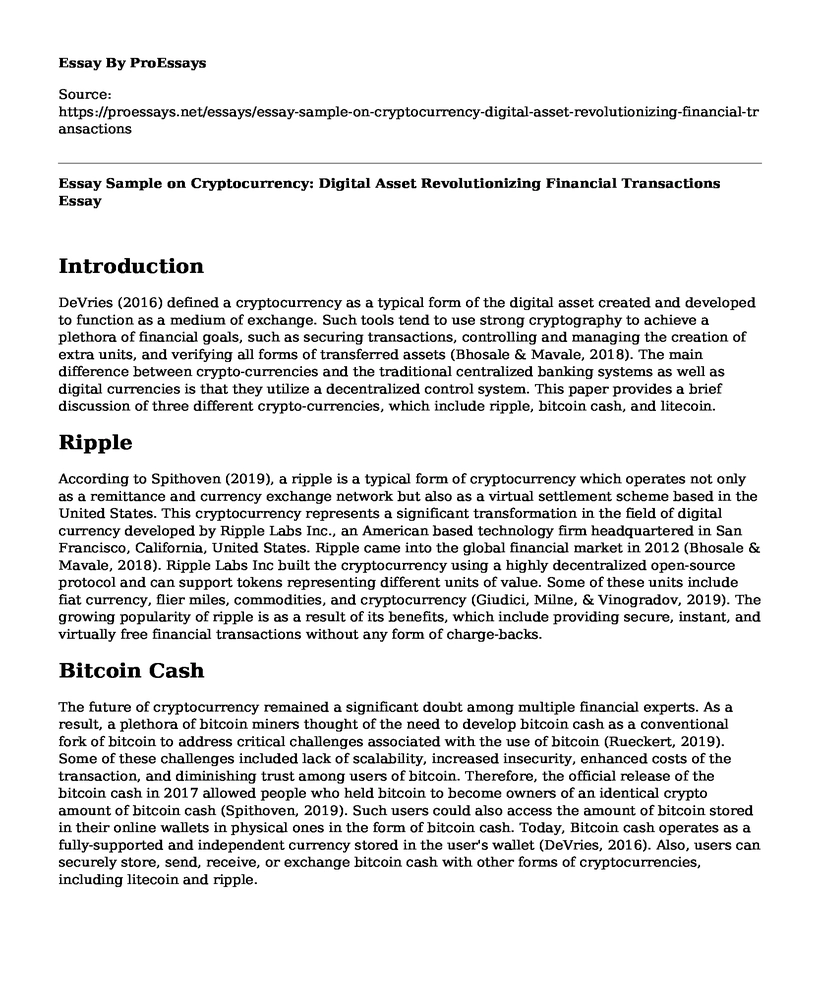Introduction
DeVries (2016) defined a cryptocurrency as a typical form of the digital asset created and developed to function as a medium of exchange. Such tools tend to use strong cryptography to achieve a plethora of financial goals, such as securing transactions, controlling and managing the creation of extra units, and verifying all forms of transferred assets (Bhosale & Mavale, 2018). The main difference between crypto-currencies and the traditional centralized banking systems as well as digital currencies is that they utilize a decentralized control system. This paper provides a brief discussion of three different crypto-currencies, which include ripple, bitcoin cash, and litecoin.
Ripple
According to Spithoven (2019), a ripple is a typical form of cryptocurrency which operates not only as a remittance and currency exchange network but also as a virtual settlement scheme based in the United States. This cryptocurrency represents a significant transformation in the field of digital currency developed by Ripple Labs Inc., an American based technology firm headquartered in San Francisco, California, United States. Ripple came into the global financial market in 2012 (Bhosale & Mavale, 2018). Ripple Labs Inc built the cryptocurrency using a highly decentralized open-source protocol and can support tokens representing different units of value. Some of these units include fiat currency, flier miles, commodities, and cryptocurrency (Giudici, Milne, & Vinogradov, 2019). The growing popularity of ripple is as a result of its benefits, which include providing secure, instant, and virtually free financial transactions without any form of charge-backs.
Bitcoin Cash
The future of cryptocurrency remained a significant doubt among multiple financial experts. As a result, a plethora of bitcoin miners thought of the need to develop bitcoin cash as a conventional fork of bitcoin to address critical challenges associated with the use of bitcoin (Rueckert, 2019). Some of these challenges included lack of scalability, increased insecurity, enhanced costs of the transaction, and diminishing trust among users of bitcoin. Therefore, the official release of the bitcoin cash in 2017 allowed people who held bitcoin to become owners of an identical crypto amount of bitcoin cash (Spithoven, 2019). Such users could also access the amount of bitcoin stored in their online wallets in physical ones in the form of bitcoin cash. Today, Bitcoin cash operates as a fully-supported and independent currency stored in the user's wallet (DeVries, 2016). Also, users can securely store, send, receive, or exchange bitcoin cash with other forms of cryptocurrencies, including litecoin and ripple.
Litecoin
According to Rueckert (2019), litecoin refers to a typical form of a peer-to-peer digital and internet-based currency that enables its users to send or receive money instantly regardless of their geographical locations. Litecoin is highly scalable and charges minimal costs for sending and receiving payment from all parts of the world when compared to other forms of cryptocurrencies, such as bitcoin and bitcoin cash (Giudici et al., 2019). This unique digital currency operates as an open-source and a highly-decentralized global payment system that lacks any form of central authority. The concept of mathematics plays a vital role in securing the entire network and empowering individuals to have ultimate control over their finances. The cryptocurrency features faster and enhanced transaction authentication times alongside improved storage efficiency as opposed to the main math-based currency (Bhosale & Mavale, 2018). Lastly, litecoin is not only a complementary financial tool to bitcoin but also one of the upcoming competitors.
Conclusion
Bitcoin cash, ripple, and litecoin represent significant inventions in the contemporary field of finance. These cryptocurrencies are increasingly changing how people to store, receive, send, and make financial payments regardless of their geographical location. Unlike the traditional centralized systems of payment, such as banks, these platforms are decentralized and allow secure, efficient, and reliable operations with minimal costs, as discussed in this paper.
References
Bhosale, J. & Mavale, S. (2018). Volatility of select Crypto-currencies: A comparison of Bitcoin, Ethereum and Litecoin. Annual Research Journal of SCMS, Pune, 6(1), 132-141. Retrieved from https://www.scmspune.ac.in/journal/pdf/current/Paper%2010%20-%20Jaysing%20Bhosale.pdf.
DeVries, P. D. (2016). An analysis of cryptocurrency, bitcoin, and the future. International Journal of Business Management and Commerce, 1(2), 1-9. Retrieved from https://www.researchgate.net/publication/316656878_An_Analysis_of_Cryptocurrency_Bitcoin_and_the_Future.
Giudici, G., Milne, A., & Vinogradov, D. (2019). Cryptocurrencies: Market analysis and perspectives. Journal of Industrial and Business Economics, 47(1), 1-8. Retrieved from https://link.springer.com/article/10.1007/s40812-019-00138-6.
Rueckert, C. (2019). Cryptocurrencies and fundamental rights. Journal of Cybersecurity, 5(1), 11-20. Retrieved from https://academic.oup.com/cybersecurity/article/5/1/tyz004/5521109.
Spithoven, A. (2019). Theory and reality of cryptocurrency governance. Journal of Economic Issues, 53(2), 385-393. Retrieved from https://www.tandfonline.com/doi/full/10.1080/00213624.2019.1594518.
Cite this page
Essay Sample on Cryptocurrency: Digital Asset Revolutionizing Financial Transactions. (2023, Apr 08). Retrieved from https://proessays.net/essays/essay-sample-on-cryptocurrency-digital-asset-revolutionizing-financial-transactions
If you are the original author of this essay and no longer wish to have it published on the ProEssays website, please click below to request its removal:
- Some Questions on Investments
- Paper Example on Preparation and Use of Cash Budget
- Problems Facing the U.S. Immigration System Essay
- Essay Sample on Financial Technology Programs
- Performance Measures of Diageo Business Paper Example
- Paper Example on TAM's Growth: From $1M to $25M in 2009 Under Jack's Management
- Paper Example on Reimbursement Models in Healthcare: SWOT Analysis







